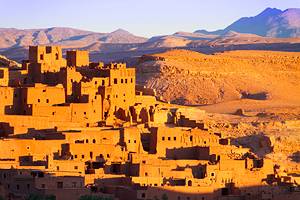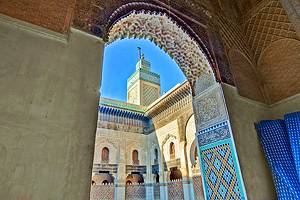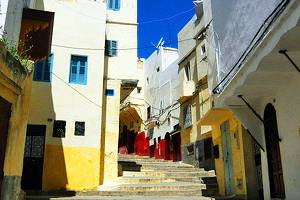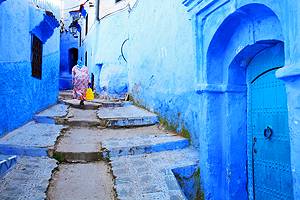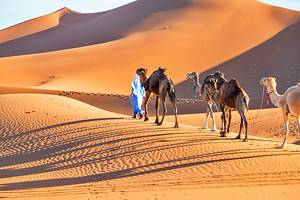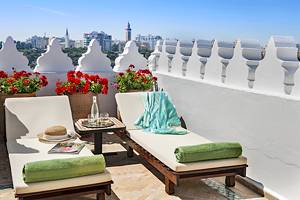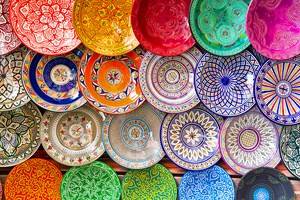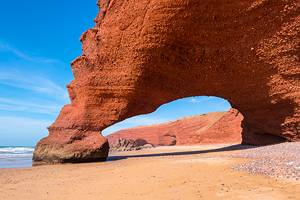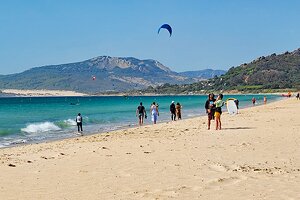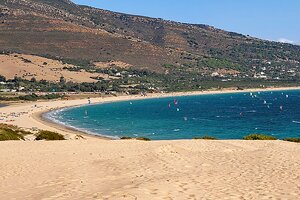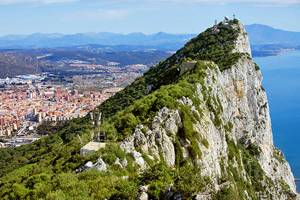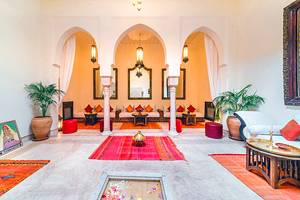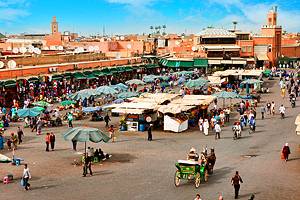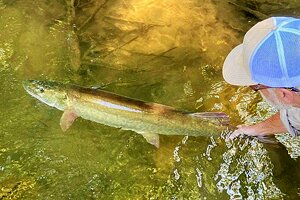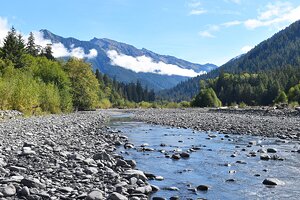14 Top-Rated Attractions & Things to Do in Rabat
As Morocco's capital, Rabat is home to the country's most important museum, the Royal Palace, and the Mausoleum of Mohammed V, as well as several historical tourist attractions.
As one of Morocco's Imperial Cities, Rabat is one of the best places to visit while traveling up or down the Atlantic Coast. Smaller and less famous than the Imperial Cities of Marrakesh and Fes, Rabat's calmer atmosphere can also be a welcome break from the tourist hustle of other cities.
The Bou Regreg River runs along the city's western rim, separating it from its sister city of Salé, which is worth exploring while here. Other major things to do while in town include visiting both the Chellah excavation site and the Oudaias Kasbah.
Discover the best places to visit in the city with our list of the top attractions and things to do in Rabat.
See also: Where to Stay in Rabat
- 1. Stroll the Oudaias Kasbah
- 2. Admire the Hassan Tower
- 3. Visit the Mausoleum of Mohammed V
- 4. Explore the Chellah Necropolis
- 5. Wander through Rabat's Medina
- 6. Visit the Mohammed VI Museum of Contemporary Arts
- 7. Stroll Rabat's Ville Nouvelle
- 8. Take in Moroccan History at Rabat Archaeology Museum
- 9. Trip across the River to Salé
- 10. Visit the Abou Hassan Medersa in Salé
- 11. Take a Nature Break within the Jardins Exotiques
- 12. Day Trip to the Sites around Kenitra
- 13. Visit Moulay Bousselham
- 14. Surf or Sunbathe on Rabat's Nearby Beaches
- History of Rabat
- Where to Stay in Rabat for Sightseeing
1. Stroll the Oudaias Kasbah
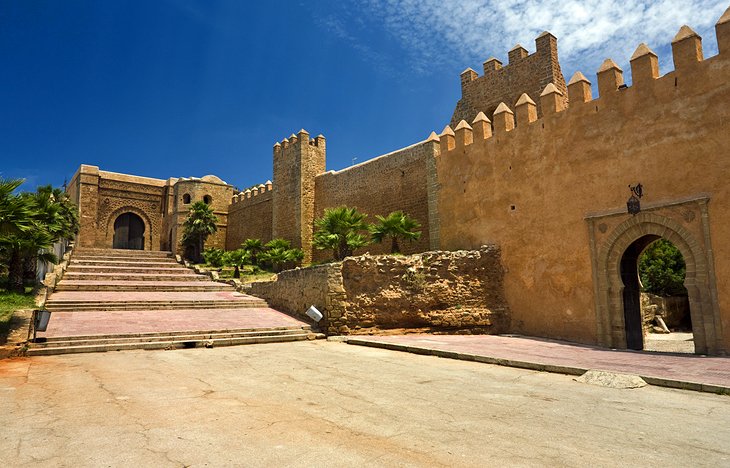
Rabat's Kasbah district is one of the city's top sightseeing draws. Inside the 11th-century fortress walls is a small neighborhood of winding lanes rimmed by Andalusian-style houses. This is a prime area for a meandering stroll, with plenty of photo opportunities within the narrow blue-and-white lanes.
At the Kasbah's southern end, you'll find the tranquil Andalusian Gardens. If you're traveling with little ones in tow, this welcome green space is a prime opportunity to let them run wild without worrying about cars and delivery cyclists. The gardens have plenty of shade, under palms and orange trees, and fountains are dotted around the walkways.
For photos, head to the district's northern tip, where there's a platform offering panoramic views over both the Atlantic Ocean to the west and Salé to the north.
The most impressive gateway into the Kasbah is the 12th-century Bab Oudaia in the southern wall. From Bab Oudaia, the main road of Rue el Jamma leads to the Kasbah Mosque, which is the oldest mosque in Rabat.
Address: Place de Oudaia
2. Admire the Hassan Tower
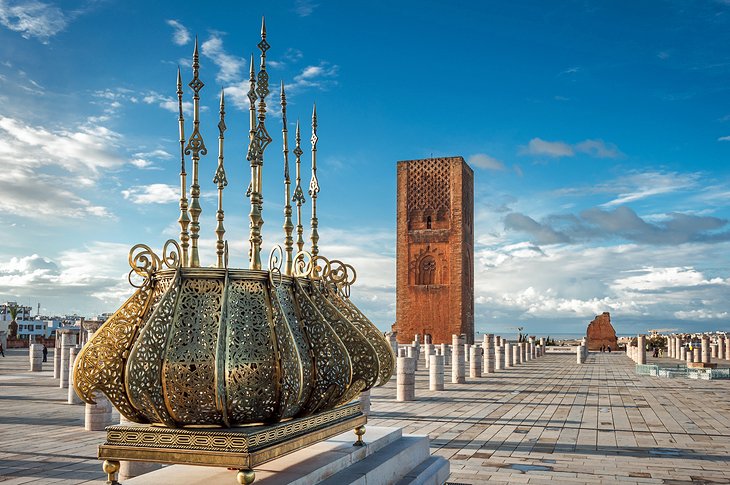
Built by the Almohads, the unfinished Hassan Tower (Le Tour Hassan) was the work of ruler Yacoub al-Mansour and would have been the minaret for his grand vision of a massive mosque on this site that was planned to be one of the largest in the world.
Upon his death in 1150, construction was abandoned, and this 45-meter-high tower is all that remains of his original ambitious plan.
Intricately carved motifs and designs cover the tower's facade, pointing to the sumptuousness of what al-Mansour had in mind.
The Hassan Tower, and the neighboring Mausoleum of Mohammed V both sit inside the manicured gardens of Jardin Tour Hassan. This is a hugely popular spot for local families to hang out and stroll at dusk, so come then if you want to see some local life.
Address: Jardin Tour Hassan, Avenue Tour Hassan
3. Visit the Mausoleum of Mohammed V
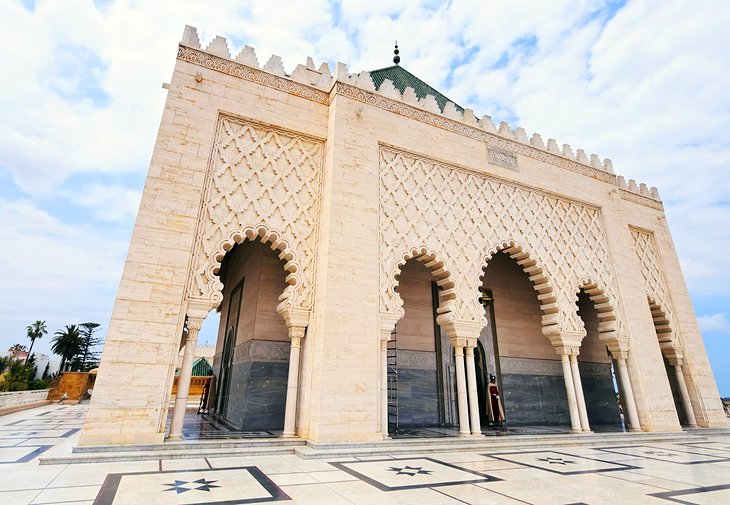
The glittering Mausoleum of King Mohammed V was built on the very place where, upon his return from exile in Madagascar, he gathered thousands of Moroccans together to thank God for giving independence to their country.
As well as the tomb of Mohammed V, his son King Hassan II is also buried here.
The opulent tomb chamber is a showcase of Moroccan traditional design, resplendently decorated, with zellige tile work covering the walls around the grand marble tomb.
Non-Muslims cannot enter the adjoining mosque but are able to view the mausoleum's tomb chamber from a terrace above, as long as they are dressed respectfully (shoulders and knees covered).
Address: Jardin Tour Hassan, Avenue Tour Hassan
4. Explore the Chellah Necropolis
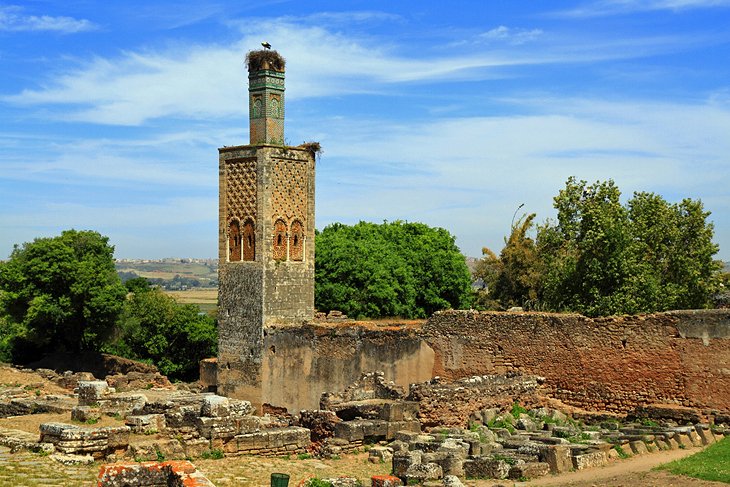
The remnants of the 14th-century Merenid citadel-town of Chellah are an atmospheric place. The walled ruins are positioned on an older Roman town called Sala, which archaeologists uncovered evidence of in the 1930s. Today, parts of both these settlements can be seen.
Chellah thrived as a Merenid citadel in the early 14th century. The crumbled ruins of mosques and mausoleums they built here are now covered with rambling brambles, providing nesting sites for storks. The excavated Roman part of the site includes a forum, bath, and temple.
For a good overview of the entire Chellah ruins, an overlooking terrace provides excellent views across the site.
Address: Avenue Yacoub al-Mansour
5. Wander through Rabat's Medina
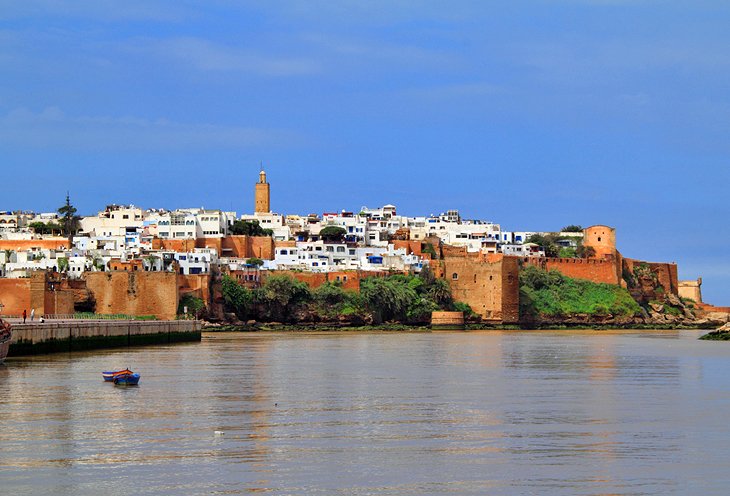
Rabat's rambling medina area has a distinctly Andalusian style to its buildings, as most of the architecture here dates from the 17th century, when Muslims from Spain's Andalusia region arrived. This makes it very different from the medinas of Fes and Marrakesh.
If you found exploring the medina districts of Fes and Marrakesh rather intense, Rabat offers a more laid-back experience with far fewer crowds.
In particular, while strolling here, look out for the Grand Mosque on Rue Souka, built by the Merenids in the 14th century. Nearby is a Merenid-built fountain.
The Mellah (Jewish Quarter) is in the medina's southeast corner.
Rabat medina's souq area is still very orientated towards locals doing their grocery shopping, rather than tourists hunting down souvenirs, which means this is a great place to sample and buy local produce, particularly dates, spices, olives, and pickled vegetables.
If you're looking for bargains and local craft work, the two best shopping streets are Souq es Sebbat and Rue Souka.
The medina is the best place in the city for getting into Moroccan street food. Tiny hole-in-the-wall grilled meat stalls, canteens, and bakeries are scattered through the alleys, so make sure to pull up a pew at a street front table to munch on brochettes (kebab skewers) and merguez (sausages) for lunch, or continue your wanders with a makouda (potato fritter) in hand.
The Kasbah district sits just off the medina's northeast corner, so it's easy to combine visits to both in one morning or afternoon.
Address: Avenue Hassan II
6. Visit the Mohammed VI Museum of Contemporary Arts
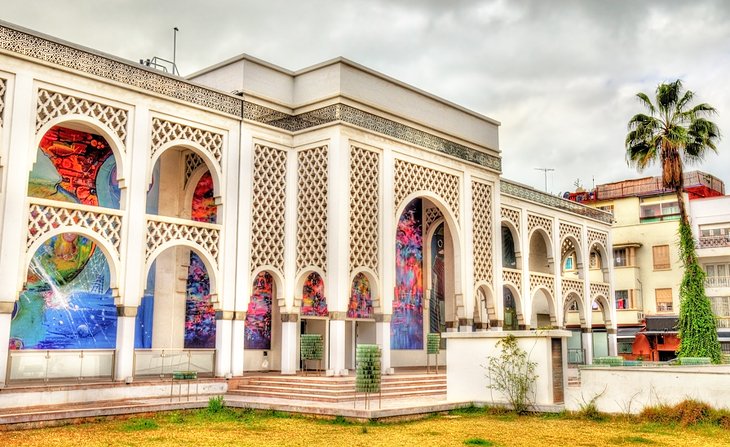
For anyone interested in Morocco's modern art movement, this museum is one of Rabat's top things to do. The permanent collection, housed in an impressively renovated building dating back to the French colonial days, is small but holds artworks from nearly all the country's top names in the art world, from the mid-20th century to the present day. There is also a program of temporary exhibitions featuring both local and international artists.
A visit here makes a lovely contrast to viewing the traditional artisan work for which Morocco is rightly famous and shows the contemporary side to the country's long artistic expressions.
Address: Avenue Moulay Hassan, Rabat
7. Stroll Rabat's Ville Nouvelle
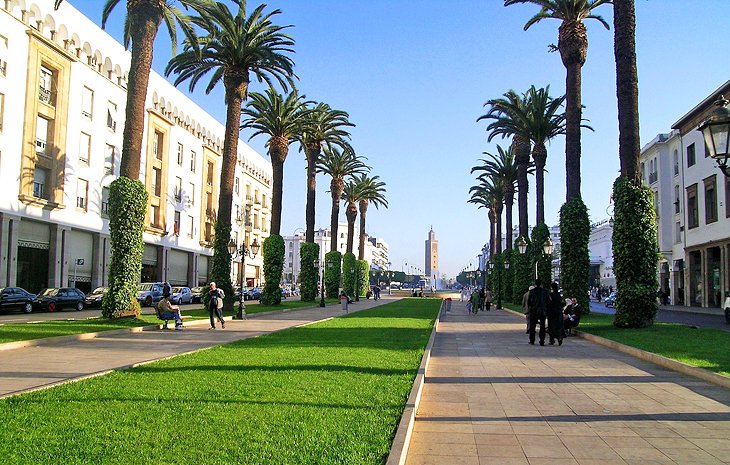
Rabat's Ville Nouvelle (New City) is home to the Archaeological Museum and also the surprisingly interesting Postal Museum (on Avenue Mohammed V), which brings together a superb collection of Moroccan stamps, telephones, and telegraph machines.
The streets of the Ville Nouvelle host a wealth of French colonial architecture and are a pleasant place for a stroll. Try to come just at dusk when the birds are all swooping between the avenue trees, finding their place to roost, and Rabat locals are crowding into the street front cafes.
Right on the district's edge, Avenue Hassan II follows the 17th-century defensive wall separating the modern city from the medina.
To the south of the Ville Nouvelle is Rabat's Royal Palace, constructed in 1864 and fenced off from its surroundings with a grand wall. The complex is not open to the public, as the current king still uses the palace as his residence.
You can get good photographs of the palace exterior from the nearby Sunna Mosque.
8. Take in Moroccan History at Rabat Archaeology Museum
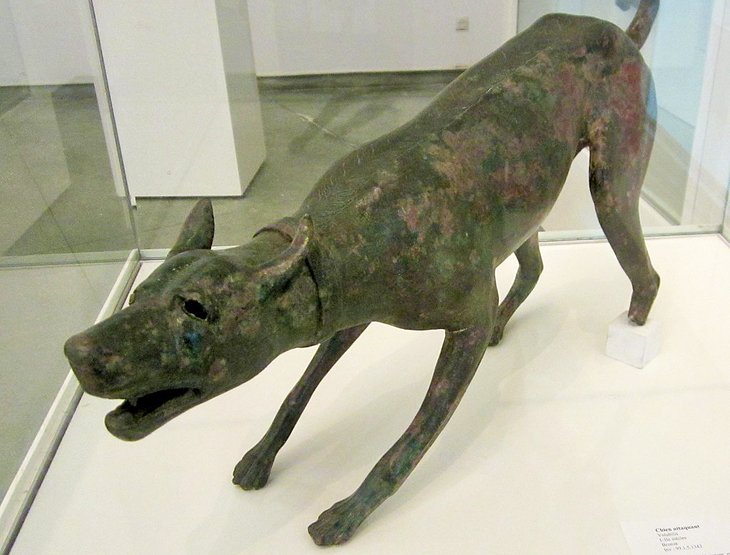
Built in 1932 and enlarged a few years later to display excavated finds, this museum is home to Morocco's best archaeological collection.
The prehistoric section brings together human remains from the Middle Paleolithic period to the Neolithic, illustrating the continuity and size of the population at this time.
Pre-Roman civilizations are well represented in the collection, but the Roman-era exhibits, hailing from Morocco's major archaeological sites of Lixus, Volubilis, and Chellah, are the museum's highlights and include bronzes, ceramics, and statuary.
Even if you're not a museum person, this is the one museum on your Morocco travels that you shouldn't miss.
Address: Rue al-Brihi Parent, Rabat
9. Trip across the River to Salé
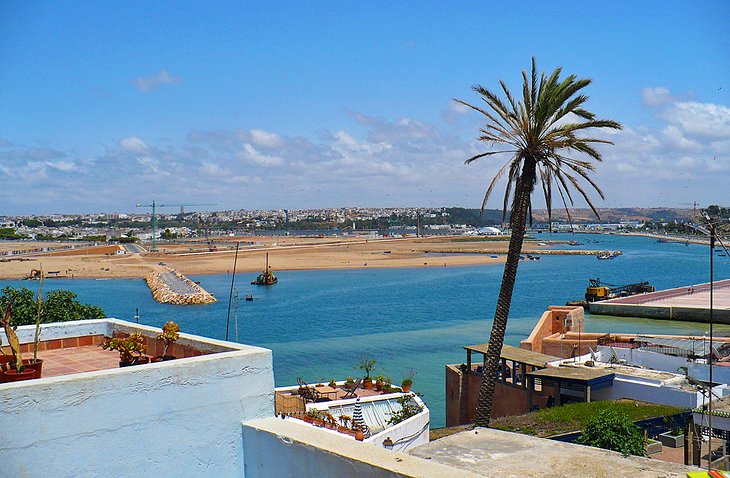
Sitting directly across the Bou Regreg river from Rabat, Salé is a quaint and picturesque place to spend a few hours in the afternoon.
The medina district here is dotted with important historic monuments that have been carefully restored. As well as the Abou Hassan Medersa, the district is also home to Salés' Grand Mosque, the Mausoleum of Sidi Ben Ashir with its photogenic whitewashed tomb, and the Fondouk (khan) al-Askour.
Salé is known for its craft work and the medina offers some wonderfully atmospheric souqs (market streets), where you can join in with the locals and try out your haggling skills. The shopping souqs here are very much a local affair and haven't been overly trussed-up for the tourists, which makes them an interesting counterpoint to the souq streets of Marrakesh and Fes.
For the best photo opportunities of the thick, mighty walls of Rabat's Oudaias Kasbah on the other side of the river, head to Salé's beach.
After exploring the medina district, head to Salé's Marina Bouregreg, a modern marina complex with a collection of modern cafés and restaurants, and views across the river to the Hassan Tower. This is a popular spot for sampling cafe life in the early evening.
The easiest way of getting to Salé is to hop on the Rabat-Salé tram. It's incredibly cheap and runs every twenty minutes between 6am and 10pm.
Address: Place Hassan II, Salé
10. Visit the Abou Hassan Medersa in Salé
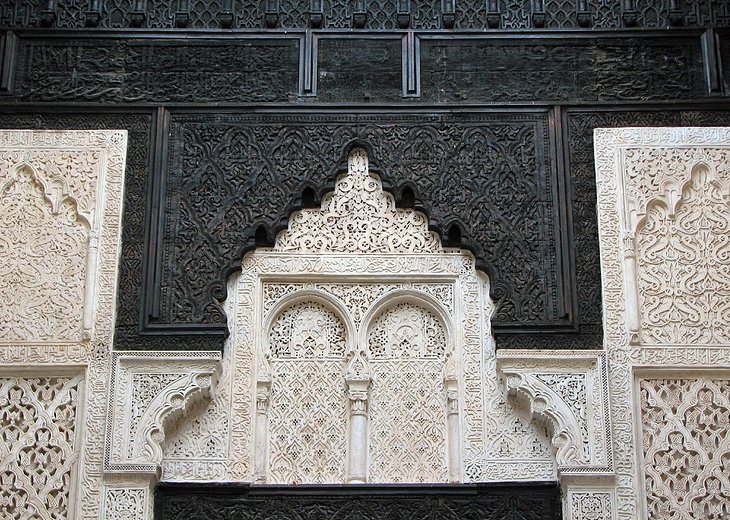
Directly across the Bou Regreg River, facing Rabat, the town of Salé is home to several interesting medersas (Islamic schools of learning) and mausoleums. The most popular of these buildings to visit is the Abou Hassan Medersa, which is renowned for the fine craftsmanship on display within its interior.
The Abou Hassan Medersa dates from the Merenid era in the 14th century. Its internal rooms and courtyard are covered with beautifully restored examples of traditional religious decoration, including zellige tile work, elaborately carved stucco work, and intricately carved wood panels.
If you climb up to the roof, you can enjoy excellent views across the water to Rabat.
Address: Rue Ras ash-Shajara, Salé
11. Take a Nature Break within the Jardins Exotiques
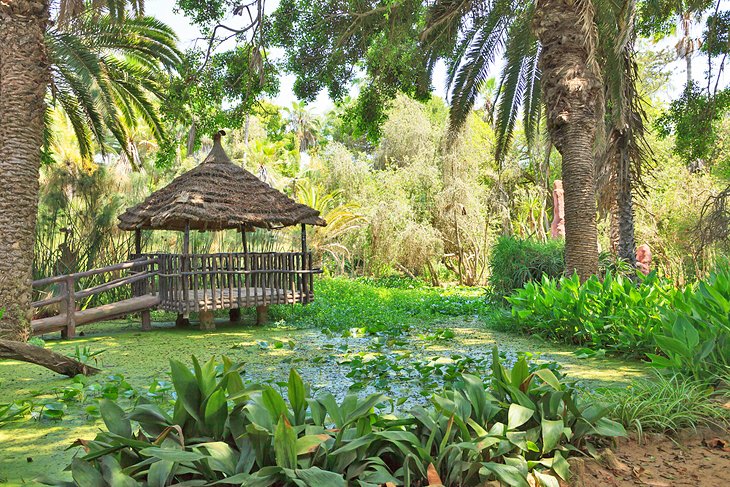
For a slice of lush nature, take a trip out to Jardins Exotiques, about 13 kilometers north of Rabat.
This vast series of gardens, shaded by tall palms, was the work of French horticulturist Marcel Francois, who brought plant species from sub-Saharan Africa, Asia, and South America here to create a showcase of exotic nature.
A series of walkways, scattered with ornamental bridges, water features, and follies, wind through the gardens, which today have a shaggy, overgrown ambience that adds to the charm.
The paths here lead you on walks that range from an easy 30-minute stroll to the Red Trail's three-hour exploration which traverses every section of the park, so there's a choice for everyone.
It's hugely popular on weekends with local families, so for a quieter experience head here on a weekday. Make sure to pack water, particularly if you're embarking on the Red Trail. There's a great café near the entrance, perfect for chilling out after exploring the park.
Address: Route de Rabat, Bouknadal
12. Day Trip to the Sites around Kenitra
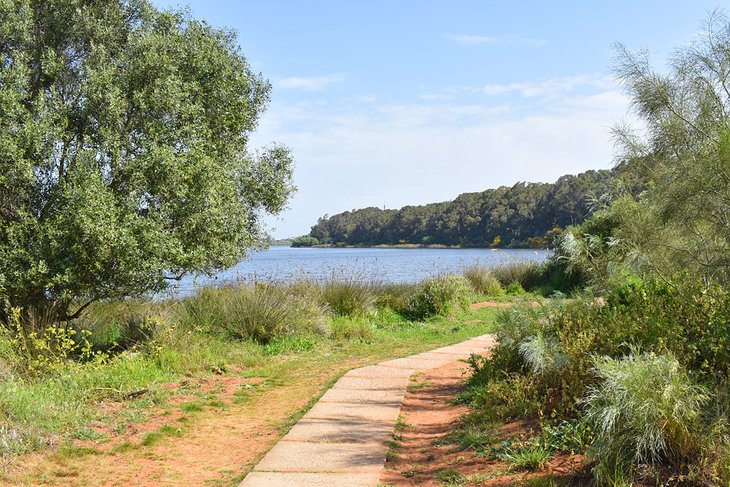
Established as a military fort by Morocco's first French Resident General in 1912, Kenitra is a modern town on the road to Tangier, about 46 kilometers north of Rabat.
Although the town itself doesn't have much to offer visitors, it's a great base for trips to the bird-watching haven of Lac Sidi Boughaba National Park. This park, just on the outskirts of town, is a major stop-off point for migratory birds between October and March.
Other nearby sightseeing attractions include the Roman garrison site of Thamusida, just to the north of Kenitra. Although sparse, the ruins of Thamusida include a temple, bath, housing, and a large garrison camp area.
13. Visit Moulay Bousselham
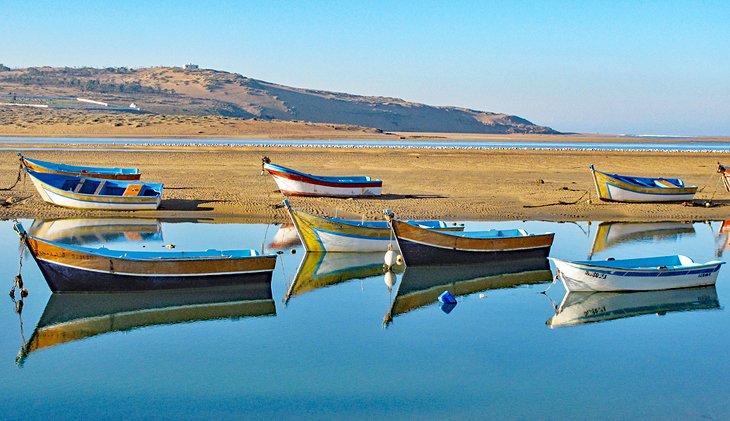
Known for its scoop of beach, bobbing fishing boats in the port, and the bird-spotting activities of Merja Zerga National Park, Moulay Bousselham, 140 kilometers north of Rabat, is an easygoing place to while away a day or two.
It's a good stop-off point on a journey up or down the Atlantic Coast between Rabat and Tangier.
For bird-watchers, a visit to Moulay Bousselham is all about getting onto the lagoon of the national park, where herons, plovers, egrets, and flamingos can be easily spotted on a boat trip, while those just after a relaxed day can enjoy the golden sand that fronts the town.
14. Surf or Sunbathe on Rabat's Nearby Beaches
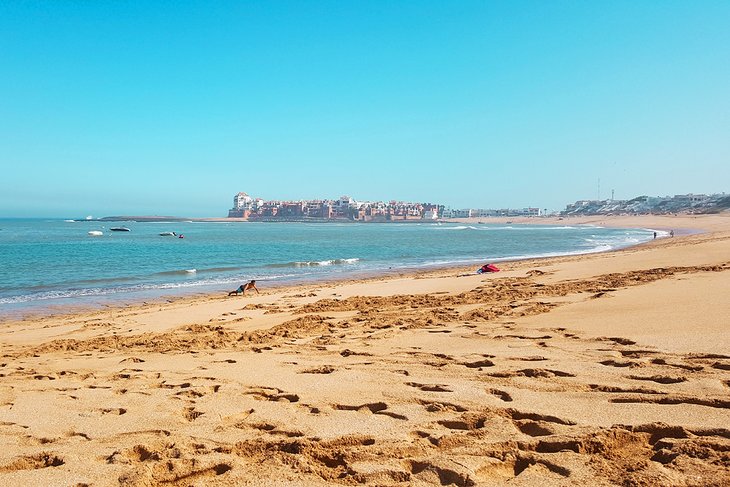
Two beaches near Rabat are known for their good surfing. The beach of Plage des Nations sits 17 kilometers to the north of the city and is a popular spot with local surfers because of the wave action. There are sun loungers with shades for rent on the sand and a decent café on-site. Note that the waves and currents can be very strong here, so only strong and experienced swimmers should go in the water.
About 15 kilometers south of Rabat is the beach of Temara Plage. The sandy strip here can get very busy during July and August. Again, this is a popular beach with surfers, but the waves and currents mean that weak swimmers should refrain from heading far into the sea.
If you don't mind heading a bit farther south, Bouznika Plage (40 kilometers south of Rabat) is one of the best beaches in the area for sunbathing and swimming with a long bay of golden sand, plenty of sun loungers and shades, and nearby cafés for refreshments. It's hugely popular with local families on summer weekends.
History of Rabat
Rabat was founded as an Arab army outpost in the 12th century and given the generic name for military encampment, Ribat, which is still in use today.
For centuries, Rabat and Salé were rival principalities, but eventually, Rabat began to dominate the area. Salé's power was ultimately eclipsed altogether by its larger neighbor.
In the early 17th century, Rabat became a center of anti-European piracy, with its stronghold at the Kasbah des Oudaias.
Rabat was first made a modern capital in 1912 by Morocco's French overlords, and remained the nation's capital after independence in 1956. The city is the residence of Morocco's royal family.
Where to Stay in Rabat for Sightseeing
To experience all the fascinating sights and sounds of Rabat, the best area to stay is in the city center, near the medina and the Oudaias Kasbah with its tangle of alleyways and old buildings. Other attractions, such as the Hassan Tower and Royal Palace, are a short taxi ride away. Some of the best-value accommodation options are in riads, a type of traditional Moroccan guesthouse with an interior courtyard.
Luxury Hotels:
- Distinctly Moroccan in style, the Hotel la Tour Hassan, with a pool and spa, lies within walking distance of the medina, Oudaias Kasbah, Hassan Tower, and the Royal Palace. It's Rabat's most prestigious hotel.
- The Sofitel Rabat Jardin des Roses, about two kilometers from the Royal Palace, sports a more contemporary Moroccan style and presides over acres of palm-studded gardens and a lovely outdoor pool.
- At the high end of the luxury hotels, Villa Diyafa Boutique Hotel and Spa is in Rabat's Ambassador's District, a short taxi ride from the city sights, and offers limousine transfers and personal butlers for select rooms.
Mid-Range Hotels:
- Near the coast and just inside the medina, the Riad Kalaa is steeped in elegant Moroccan style and offers a restaurant and pool. It's about eight minutes on foot from the Oudaias Kasbah.
- Also in the medina, Riad Zyo resides in a modern whitewashed building, with chic rooms, a small courtyard pool, and a rooftop terrace.
- Nearby Riad Dar El Kebira is another stylish guesthouse, with a hammam and spa. The included breakfast is served on the rooftop terrace.
- An easy stroll from the medina and the Mausoleum of Mohammed V, Le Diwan Rabat - MGallery Collection is known for its colorful, modern rooms with an Art Deco theme and has a spa and restaurant.
Budget Hotels:
- Just outside the gates to the medina, Riad Meftaha is an authentic Moroccan guesthouse with a tranquil courtyard and striking tilework. It's known for its helpful staff and it includes breakfast.
More Related Articles on PlanetWare.com
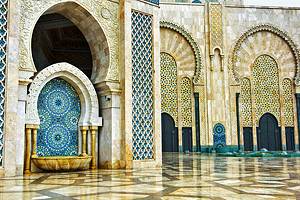
Exploring the Coast: For literary history, head north to Tangier, famed for its 1950s hey-day, when foreign writers and artists flocked here. Or head south to Casablanca to view the beautiful Hassan II Mosque and experience contemporary Moroccan city life, and then onward to Agadir, the country's premier beach town.
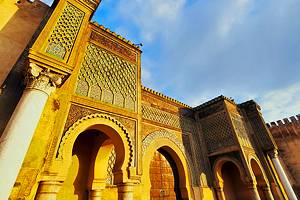
Heading Inland: From Rabat, the old imperial city of Meknes is only a short train ride away and is a fantastic base from which to explore the Roman ruins of Volubilis. From here, head on to Fes to get lost amid the ultimate Moroccan medina.


